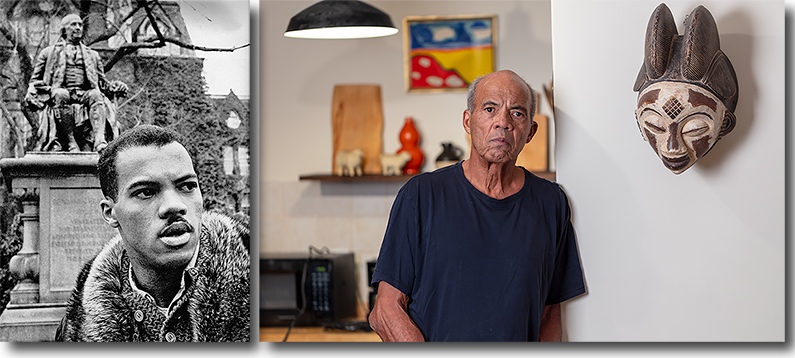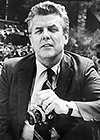John Edgar Wideman – "The Astonishing John Wideman"

|
|||
|
|
Standing in front of a statue of Benjamin Franklin, John Wideman gazes across the University of Pennsylvania campus. Philadelphia, PA, May, 1963, photo by James Hansen. |
|
John Edgar Wideman in his lower east side apartment in New York City, that he says is decorated by his wife, French journalist Catherine Nedonchelle. Photo by Bill Ganzel, November 2023. |
|
|
John Wideman was "astonishing" because, in 1963, he was the second African-American in U.S. history to win a Rhodes Scholarship to study at the University of Oxford in England. He traces his lineage back to slavery and grew up poor in the Homewood neighborhood in Pittsburgh. He discovered a love of reading early in his life, in part, he says, "as a way of getting out of my circumstances." His teachers noticed his intelligence early on, and Wideman combined that with a love of basketball to earn a scholarship as a student athlete at the University of Pennsylvania in Philadelphia. At Oxford, he studied literature and continued to attempt to leave his heritage behind. In his interview, he said it was a stereotypical Oxford don who challenged him write from his own life experience. At first, he resisted. But gradually, Oxford and the Iowa Writer's Workshop changed his focus and honed his craft. As of 2023, he has published 10 novels, five memoirs, and several story collections and omnibus editions. He was the first person to win the PEN/Faulkneer Award for Fiction twice. |
|
In 2017, Wideman published Writing to Save a Life, The Louis Till File. In 1955, a 14-year-old boy, Emmett Till, was murdered and mutilated in Mississippi for supposedly whistled at a white woman. Emmett's mother brought her son's body home to Chicago and insisted he be displayed as he was killed. Wideman was the same age as Emmett Till and remembers seeing the horrific photos. Years later, Wideman discovered the story of Emmett's father, Louis, who was a black soldier in Italy during World War II. Louis was accussed, convicted and executed for raping and murdering a white woman in Italy – all on sketchy evidence. The book is a remarkable feat of research, yet its tone is meditative and searching. Wideman says that the decade of the 1960s changed history and the lives of those who lived through it. |





